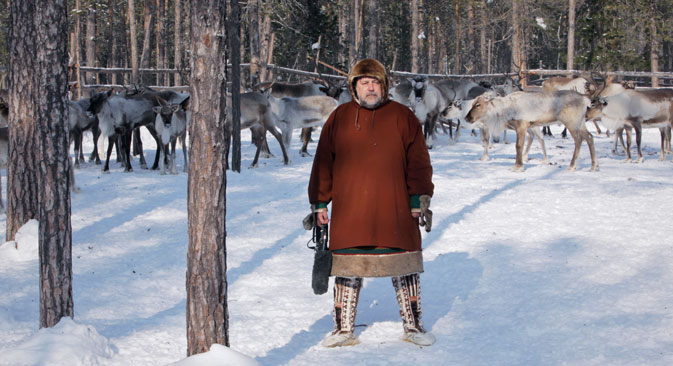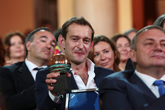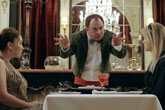Russia's 'Pipeline' reaches London

Director Vitaly Mansky (pictured): 'One of the most chilling scenes shows a funeral in the Vologda Region where local men cut through the frozen ground with axes to put a coffin into it.' Source: Press Photo
The documentary film Pipeline has collected a number of prestigious awards in recent months, compelling the world to remember people who live alongside a giant natural gas pipeline that links Western Siberia to Western Europe. It reaches London next month as a competition entry at the Seventh Russian Film Festival, which runs from November 7-17.
Exactly 30 years ago a ‘pipes in exchange for gas’ agreement was signed between the Soviet Union and Germany, and Soviet natural gas started flowing to the West. It has been flowing ever since.
Official trailer with English subtitles. Source: Youtube / Peter Sun
The film crew travelled the entire length of the pipeline in 104 days – from Urengoi to Cologne. They saw a lot of funny things, but even more sad things.
The episodes are weaved together. The Northern Urals. A priest enters wooden sheds and mobile homes that hug land around the pipeline. He offers to baptise a new-born baby, but nobody is interested. They are not sure God even exists. What do those people need to be happy? Not a lot: a convenience store nearby and electricity. They have neither.
And at the other end of the pipeline, in Cologne, stores are full to the brim with products and food; there’s an endless carnival going on. Streets and houses glitter with electric lights. Yet, paradoxically, there’s no happiness in sight there either. There’s a kind of joyless, mundane fun. Glazed eyes, full of ignorance and a lack of awareness. “A night away, closer to death by a day,” quips a Siberian babushka. It seems like the same goes for Cologne too – despite all of the European affluence on display.
“I don’t think Western viewers are too happy that the film doesn’t depict the European way of life as something blissful compared to Russia,” says Mansky. “But people in the industry have expressed rather positive opinions about the film. The Western audience actually judges it mainly on professional criteria. I hear more talk about the visuals, the dramatic approach. Emotions among Russian viewers span the range from total rejection to admiration, from tears of compassion for the characters to feeling sorry for the country. In Europe, the film is perceived more rationally.”
At times, it seems that the director Vitaly Mansky was filming 1983 rather than 2013. The vague promises of officials that the “gas will make you warm too...in the future” have not changed a bit. An eternal flame goes out on the square of a provincial town; workers try to get it going again with a cigarette lighter, but there’s no gas. Drunkenness, misery and an amazing sense of resignation above all – as if it were an act of God. Life seems transient and ephemeral, yet it drags on and on.
The closer the camera gets to the West, the better looking the landscape and apartments become – and the better fed the cows and goats appear. The people are calmer and more self-assured.
“Russia is special in that it doesn’t consider European values to be values at all,” the director says. “One of the most chilling scenes shows a funeral in the Vologda Region where local men cut through the frozen ground with axes to put a coffin into it.
“Europeans watch this in horror, but for us this is quite natural. What’s more, perhaps this is the only right way to express sympathy and compassion for the deceased. But Russians watch funerals in Europe with a certain astonishment too – and rightfully so. Burying a person in a cardboard box for economic and ecological considerations is unthinkable for a Russian. A Russian will give away his last shirt to pay his last respects properly. People save money for a funeral their entire lives. They invest their souls in funerals.
"It’s not like in Europe, where you come to the crematorium wearing lacquer shoes, listen to Ave Maria for five minutes, and don’t even say goodbye to the dear departed, who you can’t see anyway because a closed casket is wheeled in on a gurney and then wheeled out. How is it possible not to cry a river over a person that’s gone forever? We are different in birth, in death, in the entire life cycle. The pipeline doesn’t unite us like politicians and economists would like it to, it divides us instead.”
Many critics and viewers have interpreted Pipeline as a partisan document, even as an accusation thrown at the current political regime. Just look at this mother lode, a source of billion-dollar profits, serving as a backdrop to extreme misery and deprivation.
So who’s to blame? Mansky isn’t out to point fingers. Neither does he treat his characters as victims. Paradoxically, there are no unhappy people in his documentary. Nobody is going to change anything – everybody is happy with the way things are.
“In order to change something, there must be desire, and grassroots desire at that, not something coming from above. And there’s no desire. Had it been there, this would have happened three centuries ago. Russia doesn’t want to change at the physiological level.
"For a European, this situation appears hopeless. For a European-oriented Russian, it does too. But for the rest, it’s not a problem at all. Russians don’t suffer, their lives are organic. There’s an expression in Russian that translates as “to burn through life”. We are all burning through our respective lives, Russians and Europeans. Only we do it differently. And each side is miserable in the eyes of the other. But in this misery lies our happiness.”
Pipeline will be shown on November 14 at the Empire Cinema in London. To book tickets visit the website.
Would you be interested in watching the movie? Share your opinion in the comment section below!
All rights reserved by Rossiyskaya Gazeta.
Subscribe
to our newsletter!
Get the week's best stories straight to your inbox


